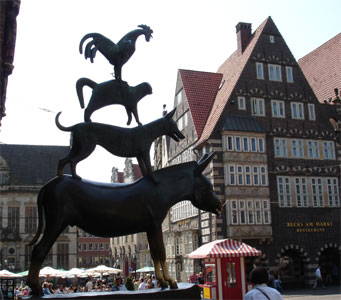Back in November 2007, I woke up from a dream and wrote this story. I think it’s pretty good, and I held on to it because I thought, maybe, some day, I might have a chance to publish it. And perhaps I will. But mostly, I want people to read it, because I really love telling stories.
Contrary to the usual policy of this site, this piece is Copyright 2007, Richard Bowen, All Rights Reserved. Unauthorized duplication is a violation of applicable copyright laws.
=============================
Dead End
by Richard Bowen
The gleaming black hearse whispered down the street, and came to a stop in front of the wall that marked the end of Whiter Alley. It was followed by a long line of equally sleek automobiles, most black, all with their light on, which came to rest in a line of luxury that stretched around the corner and out of sight. For a moment, nothing much more happened. Just the quiet humming of expensive engines, and the crunch of tires as the last few cars came to a halt.
There wasn’t much traffic on Whiter, not since the wall was built back in ’48, and the few residents already on their front porches were soon joined by others, out to see the strange spectacle. They talked in almost reverential tones, as though afraid to disturb the departed one in the lead car, whoever he or she might be.
A car door opened, and a pale face peeked out into the blazing heat, looked up and down the road, and then retreated to the airconditioned sanctuary.
“I heard Sam Marlstone died. I’ll bet that’s him there, come to visit the old neighborhood one last time on his way to his final resting,” opined one old codger, squinting through the heat haze at the plackard on the side of the hearse. Feinbrun, Feinbrun, and Sons, it declared in muted grey lettering that promised nothing but the best care for your lamented departed.
“Sam died back in the war, and is buried in France,” corrected a bird-like lady, who had just emerged from the doorway with a dish towel and her hair in curlers. She looked disapprovingly at the line of cars, and retreated back into the house. Her beak-like nose reappeared through the kitchen curtains a moment later, as she continued her chores. “And, anyways, he always hated the neighborhood. Swore he’d never set foot here again the day he marched out in his uniform.”
“Did he really? That’s not what he said to me when I saw him in … when was that? I don’t know when I’ve seen cars like that. Where do you suppose they’re from? I hear they’re shipping cars in from Japan now. The very idea.” He subsided back into his novel, and the inconvenient present was forgotten again for a while.
On another porch, another wrinkled couple peered out at the armada, bundled up in spite of the burning sun.
“I wonder if they are looking for the church. George, do go tell them that it was torn down in ’32, and they should try over the other side of town. George, do you remember the day we were married, right there across the street? Oh it was so beautiful!”
George grunted non-committally, and his wife gazed dreamily at the beautiful church, no longer there across the street, but beautiful and rose-bedecked in her memory, she just a girl of 21, he a handsome soldier in his dress blues, everyone looking at them, laughing, crying, wishing them the very best that life could offer. Now, the church gone, the street shut off, her husband … well, there he was, and anyone could see …
Another car door opened, and a hat emerged that might very well have been the home of several canaries, had they not felt ashamed and flown away. The hat was followed, almost as an afterthought, by a whispy lady, deathly pale against her raven dress. She blinked at the heat, blinked up at the denizens of this strange place in which she had unexpectedly found herself, blinked at the unblinking sky, and emitted a squeak of displeasure. She looked accusingly at her watch, as though it was responsible for all of this, and disappeared back into the car, leaving a cloud of expensive perfume, and more for the neighbors to talk about in their subdued voices. Their voices wafted back and forth in the motionless air, exchanging theories.
“Molly’s daughter over in Colorado, or California, or Calcedonia – some C word – was in a dreadful accident last week. Could that be her? Why doesn’t anybody come talk to us?”
A child’s small face pressed to the window of a Lincoln, staring up at the faces across the vast gulf of time and space. A tear rolled down her cheek, and she smudged it away with a rag doll clutched in a white-gloved hand.
“Hey, Frank!” came one voice, shouted across the street, “maybe they’ve come to get you!” He laughed an ugly, rasping laugh, with no humor in it, but he was hastily hushed, and scolded, by a half-dozen voices in shocked, whispered tones. “Show some respect!”
The door of the hearse opened, and a black-clad cheauffeur climbed out, incongruusly small for the enormous car. A puff of cold air issued from the open door, and he quickly closed it, to keep the arctic in, the desert wastes out. He cleared his throat, as though afraid to break the crystal silence, and looked around, unsure who to address.
“I … uh … excuse me … I …”
He stopped, unsure how to proceed from that eloquent opening remark. He waited, eyes downcast, for someone to respond. Nobody did. Whispers from a dozen porches reached him.
“Is that Lou’s boy?”
“Lou’s boy died in ‘Nam, Milly.”
“He looks like a Grunman, doesn’t he?”
“No Grunman would be wearing anything that fancy.”
“Do you suppose … ?” “Who do you think … ?”
He cleared his throat and tried again.
“What street am I on?”
The whispering stopped, and the looks became suspicious again. The silence stretched on, and the black beetles crouched in the middle of the street, their occupants hidden away behind tinted glass and leather upholstery.
Finally, one gentleman rose from his rocking chair and made his way down stairs perhaps older and more creaky than he. He moved gingerly, as though stepping on glass, wincing at every tentative footfall. The 10 yard distance closed slowly, as though a great journey was being undertaken across vast distances.
He looked inquiringly at the young man through foggy eyes, trying to find the answers to so many questions that he wasn’t quite able to ask, as much as he wanted to.
“This is Whiter Alley, young man,” he said respectfully, enounciating every word carefully, as though he had been preparing this speech through all the long years since the wall had closed them off from the traffic and life of the city. “And we were wondering, me and the other folks, what it is that you’re doing here, down this …” He looked momentarily uncomfortable, seeming to have trouble getting a word out, then forged on. “… Dead end,” he finished, with decision.
A few stifled titters emerged from the man who had yelled at Frank, and he was, like before, hastily shushed.
“Whiter,” said the cheauffeur, with a mixture of disappointment and revelation in his bright voice, which was so anachronistic in this dark place. He muttered something quietly, which might have been “My grandfather used to …” But then again, it might not have been.
He extracted a compact hand-held radio from his coat pocket and said quietly into it “We’ve turned down Whiter, Mark. I think the church was on White. I don’t know if there’s room to turn around down here. See if you can get the cars in the back of the line to back out.” He listened for a moment, then said “That’s right. Thanks, Mark.” The radio went back into the folds of his jacket, and he nodded his thanks to the old man.
He turned and opened the door of the hearse, and another puff of leather-scented chilled air emerged, enveloping the spokesman in the atmosphere of wealth, and luxury and everything else foreign to this place, for just an instant. Then he himself went back into the black car, and the old man, feeling now so much older, swayed gently in the now-gone breeze. A slight smile touched his lips, ever so lightly, and then was gone, as though it had never been there.
Slowly, so very slowly, he turned, and made his way back to the decaying steps, and hauled himself back into his familiar spot on the porch.
For a long time, nothing happened. The two worlds peered at one another, but nobody spoke. Then at the far end of the street, the cars began, one by one, to pull away, back into a side street, turn around, and drive out of view, until at last, the hearse, too, backed all the way up the street, and vanished from sight around the corner, taking with it the air of unreality that it had brought into this place for that brief moment.
All those pairs of eyes stared at the spot that used to have such beautiful cars in it, wondering if they had really seen it, wondering if they would ever see it again. Dreaming of how it might be, some day. Some day.
George was the first to awake from the trance, and he turned around, as though to remind himself of where he really was. He looked across to the blighted, boarded up building that had been put up where the church once was, and seemed to be trying to remember something, but it was too far out of his reach, and it slipped away.
He turned back to his wife and said, in a faltering voice, “Sal, do you remember …”
Sal cut him off angrily. “Oh, George,” she shouted, “you always know the wrong thing to say, don’t you!” She burst into tears, and, sobbing, shuffled into the dim, dusty house.


